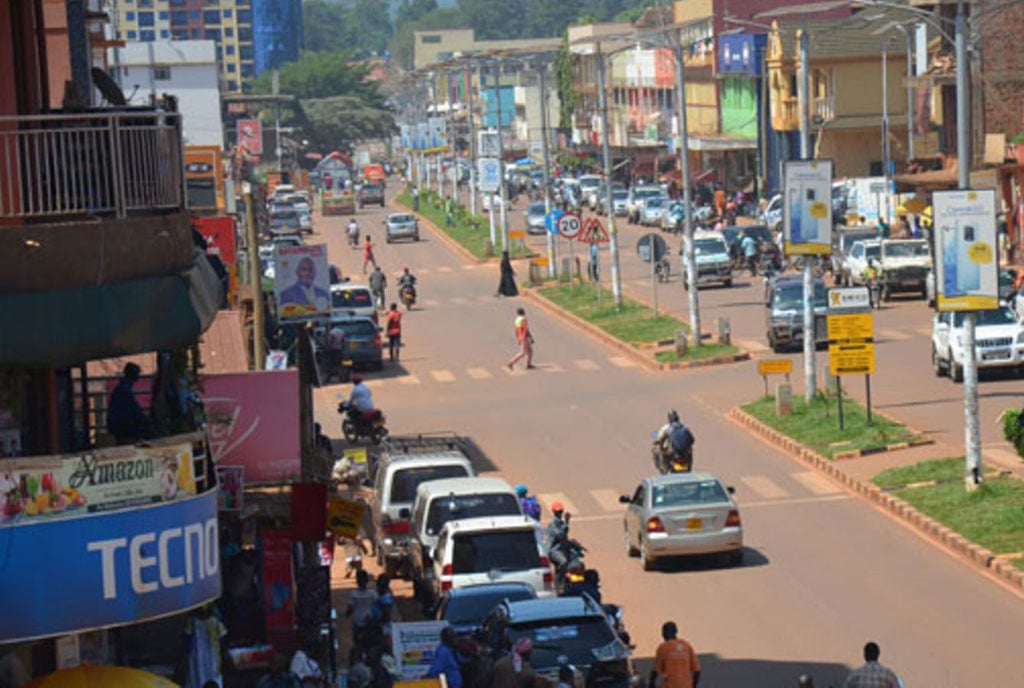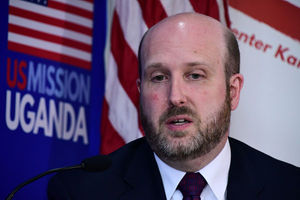
Present-day Jinja City. In 2001, three homemade devices went off in three crowded places in Jinja Town. PHOTO/FILE
On July 7, 2001, three homemade devices went off in three crowded places in Jinja Town, killing at least one person and injuring 12 others.
Security agencies have never conclusively investigated the bomb attacks. Attacks have, however, always been suspected to have been the handiwork of the Islamist rebel group, the Allied Democratic Forces (ADF) which operate in both Uganda and the Democratic Republic of the Congo (DRC).
The devices went off at Mango Bar on Scindia Road, Lillian’s Pub and the Jinja Tourist Centre. The Tourist Centre and Lillian’s Pub were at the time located on Jinja Main Street.
The dead was identified as Florence Nabatanzi, a salesgirl at Mango Bar. The proprietor of Mango Bar was Mr James Isababi, a renowned supporter of the ruling National Resistance Movement (NRM) and one of the supporters of the Uganda Patriotic Movement (UPM) in the run-up to the 1980 elections.
It has never been established whether the bar was targeted because of the proprietor’s links and support for the NRM.
At the time of the attack, the Jinja Tourist Centre, a local tour agency, was run by another NRM cadre, Mr David Wakudumira. Mr Wakudumira was the mayor of Jinja at the time. However, it remains unclear whether it had been targeted because of his political office or his links to the ruling party.
Kazibwe visits
A day after the attack, Dr Speciosa Wandira Kazibwe, then Vice President, accompanied by the Minister for Security, Mr Wilson Muruli Mukasa, went to Jinja where they inspected the sites where the bombs had gone off.
The duo, who had verbal messages from President Museveni, also visited some of the victims who had been admitted to the Jinja Regional Referral Hospital.
Dr Kazibwe informed the victims that the President would have wanted to be in Jinja to condole with the bereaved and commiserate with the injured but that he had earlier been scheduled to visit Lusaka, Zambia, where a meeting of the Organisation of African Unity (OAU) was taking place. It was the last time that African leaders were meeting under the name OAU.
The organisation was a year after the Jinja bombings renamed African Union (AU).
Dr Kazibwe, who was led on a tour of the hospital by the medical superintendent, Dr Benon Wanume, advised that three of the victims of the attack, Mr John Onana, Ms Nalusa Nabatanzi and Geoffrey Mbazira, be transferred to Mulago. Mr Mbazira was a medical student doing an internship at the same hospital.
The trio had been critically injured. Mr John Onana’s leg was subsequently amputated.
The Vice President is said to have also told the victims that the government would not only help them recover by contributing to some of their medical expenses, but that it would also work out an arrangement through which they would be helped to sustain their families.
Fear of infections
The free-speaking Dr Kazibwe then advised some of the victims whose injuries were not so serious to go home and recuperate from there.
Her concern was, however, more to do with the state of cleanliness in the wards where they had been admitted. She feared that they would get other infections if they remained admitted there.
Patel Mahendra, a Ugandan of Asian origin who sustained an injury on one of his legs, was among those who were advised to leave the hospital.
VP blasts hospital
The Vice President also used the occasion to criticise the management of the hospital for failure to maintain cleanliness. She drove her point home by declining to use one of the facility’s wash basins to wash her hands.
“The wash basins are very dirty,” she told the medical superintendent.
Beer company to the rescue
Five weeks after the blast the management of a beer company donated Shs100,000 to Ms Rose Wanyenze, the cashier at Mango Bar, who sustained injuries on the heel and lower parts of her right leg during the bomb attack.
Mr Richard Kabagambe, the area sales manager who handed over the money, said it was a small contribution towards Ms Wanyenze’s medical expenses.
Mr Kabagambe said they would be extending more assistance to Ms Wanyenze and other bar attendants who sustained injuries during the bomb attacks.
“This is only the beginning of the financial and material assistance... These are our people. They sell our products. So we are giving back in solidarity with people who sell our products,” Mr Kabagambe said.
Beer company renovates
Another beer company also moved in with a donation of Shs2m towards the renovation, painting, reroofing and furnishing of Lillian’s Pub.
The pub was reopened and handed over to the proprietor, Ms Lilian Ama, in November by Mr Peter Oloo, a sales manager.
RDC rebukes victims
However, four months after the blasts the promised government assistance had not materialised. This prompted the victims to approach the office of, Mr Patrick Baliddawa, who was the Resident District Commissioner (RDC) of Jinja.
An angry Mr Baliddawa, however, rebuked the group saying they needed to realise that the government was only trying to assist them to survive.
The government, Mr Baliddawa said, never committed itself to compensating the victims as they had been making the public believe.
“I want this to be very clear. All that the government promised was to give them some assistance to enable them to get back on their feet. The government did not talk about compensation as they have been saying,” Mr Baliddawa said.
He, however, hastened to add that though the assistance that the government promised had been delayed, it was being processed.
Still under process
It would, however, appear that the assistance that Mr Baliddawa said was being processed continues being processed, more than 23 years after the triple bomb attacks.
The matter has been the subject of several reminders from the victims and owners of the premises that were targeted.
On March 2005, Mr Onana, handed Ms Florence Nayiga Sekabira, the minister who was in charge of the Elderly and Disabled, a letter in which he tried to remind President Museveni to fulfil his pledge to assist him cater for his family.
Mr Onana said the President made the promise through Dr Kazibwe who visited him in both Jinja and Mulago hospitals.
“Since Dr Kazibwe resigned, I have tried to pursue the matter, but in vain. I request the President to come to my rescue. I no longer work and I am unable to cater for the needs of my family, not even pay school fees for my children,” the letter read in part.
It was not possible to establish whether Ms Nayiga delivered the said letter to the President. It should, however, be noted that Ms Nayiga, who represented the Kayunga District women in the eighth 8th Parliament, ceased being a member of Cabinet after she suffered defeat during the 2006 parliamentary elections.
Kazibwe visits:
A day after the attack, Dr Speciosa Wandira Kazibwe, then Vice President, accompanied by the Minister for Security, Mr Wilson Muruli Mukasa, went to Jinja where they inspected the sites where the bombs had gone off.
The duo, who had verbal messages from President Museveni, also visited some of the victims who had been admitted at the Jinja Regional Referral Hospital.




